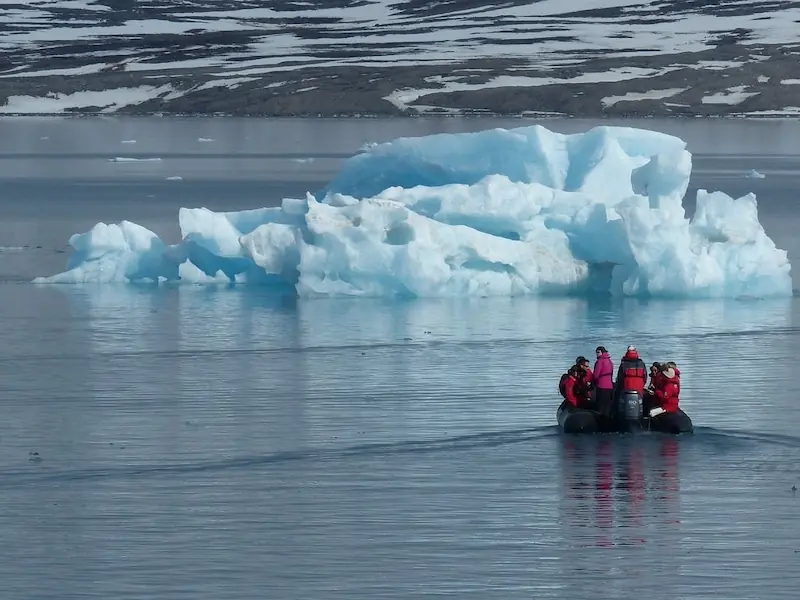A Strategic Delusion Takes Hold in the Arctic
The United States Department of Defense (DoD)’s 2024 Arctic strategy confirms that an unhealthy obsession with China has now clouded Washington’s judgment and blinded this stumbling superpower (one could now justifiably call it a stupidpower, reminiscent of the Soviet Union just before its inevitable collapse), not the first time American strategy has been rooted in a dangerous delusion.
- A Strategic Delusion Takes Hold in the Arctic
- China’s Arctic Involvement: More Norm Than Threat
- Ideological Echo Chambers in U.S. Polar Research
- Silencing the Global South in Peer Review
- Censorship, Cronyism, and Arctic Research Bias
- Cosmetic Standards as Tools of Exclusion
- Defending Diversity in Global Scholarship
- Hypocrisy and Structural Bias in Polar Research
- From Cooperation to Containment in the Arctic
- Weaponizing China in Arctic Security Narratives
Indeed, this was more than evident during its tragic, two-decade-long Vietnam intervention fueled by its tragically self-fulfilling Domino Theory, as it was again during its tragic, two-decade-long intervention in Afghanistan in the comparably self-defeating Global War on Terror.
We are creeping dangerously close to a new era of McCarthyism at so many U.S. Government-funded centers of Arctic study and policy.
Breaking with previous Arctic strategies, DoD’s 2024 strategy elevates non-Arctic China (with not a single square millimeter of Arctic territory or a cubic milliliter of Arctic waters under its flag) to the top of the Pentagon’s list of Arctic anxieties, above even mighty Russia, the largest (by territory, population and economic output) if not nimblest of the Arctic states, with undisputed sovereign control over more than half the Arctic region.
China’s Arctic Involvement: More Norm Than Threat
In its strategy, the Pentagon neglects to mention that China’s increasing Arctic ambitions are in lockstep with—and therefore mirror—those of numerous other non-Arctic states that, like China, hold observer status at the Arctic Council.
Beijing’s Arctic presence actually dates back to the interwar years of the early 20th century, as demonstrated by its status as a signatory to the Spitzbergen Treaty, which internationalized access to Svalbard’s economy—part of a polar global commons embraced by many nations, not just China, and including numerous Western states.
Moreover, China’s “dual civil-military” efforts in Arctic research – with which DoD is so concerned – mirrors that of the United States and all of its Arctic and non-Arctic partners, who until recently worked together to span old East-West divisions in the Arctic and for whom dual-use is a fact of life for Arctic research, with government funding and policy priorities having a profound (and at times ethically corrosive) effect on Arctic research worldwide.
But in fact, dual use Arctic research is much more a norm than a subversion of norms, despite the disingenuous protests by an army of DoD-funded scholars to the contrary.
Ideological Echo Chambers in U.S. Polar Research
For instance, consider these public comments made by a high official of the now shuttered Wilson Center Polar Institute, which was (rightly) closed by the Department of Government Efficiency (DOGE) in early 2025, who described to NPR’s Jackie Northam in August 2024:
“I think we see the PRC attempting to undermine regional governance and to increasingly advance this narrative that non-Arctic states should have influence in the region. So I think that is something where we do see the PRC influencing the governance conversation in a way that is contrary to U.S. interests … China sends its research ice breakers to the Arctic every year ostensibly to collect climate data. But, of course, they’re also collecting, you know, intelligence data and mapping submarine cables and all that kind of thing because, you know, everything they do is dual use.”
Such wording is offensive in its generalization and trope-like characteristics of the world’s most populous and economically consequential nation: Everything they do is dual use. Such anti-China bias runs deep throughout the American polar research community, and since NATO’s northward expansion to Sweden and Finland has been spreading like a zombie virus across Europe, with an increasingly corrosive impact on the objectivity and integrity of Arctic strategy across the expanded NATO family of nations.
Indeed, it’s become so pervasive that one of the three guest editors of the 17th Yearbook of Polar Law (YPL17) shared with me a particularly biased peer review from one of their “expert” reviewers specializing in Arctic and Antarctic law, who rejected a submission from Latin America that would have provided a much needed Global South perspective in a field long dominated by North American and Nordic scholars, one that looked more kindly upon China and Russia in the Arctic than this particular anonymous expert.
Silencing the Global South in Peer Review
One reason for this peer reviewer’s rejection of this rare and much-needed submission from the Global South was the reviewer’s dismissal of the authors’ Global South foundation of knowledge and their refreshingly (in my view) positive sentiment regarding China’s and Russia’s commitment to Arctic cooperation, trivializing and thereby arrogantly delegitimizing their undeniably valid perspective.

This expert reviewer illogically dismisses the authors’ argument that China’s and Russia’s impressively high “ranking of engagement metrics” in Arctic cooperation can serve as a proxy for Beijing’s and Moscow’s “commitment to international cooperation and polar sustainability.”
China is now routinely portrayed across the western world as the West’s Arctic nemesis.
To me, this seems a most reasonable argument—yet one that appears to grate against the hypersensitivities of those funded by, or otherwise associated with, tentacles of the American government such as the now (mercifully) shuttered Wilson Center Polar Institute and the greatly (and justly, in my view) right-sized Fulbright Research Program.
For years, these programs have recklessly funneled American taxpayers’ hard-earned dollars into expensive, globe-trotting junkets for already well-paid academics, while grooming in them a toxic and addictive ideological bias—one that favors a narrow set of interests cultivated by Washington policy elites more concerned with expanding crony networks and securing generous public salaries than with serving the American people or advancing world peace.
As the anonymous reviewer scolds: “I don’t see how a counting or ‘ranking of engagement metrics’ is a proxy for ‘commitment to international cooperation and polar sustainability’. Russia and China are ranking high on these but aren’t both of them currently spoiling and obstructing polar multilateralism?”
The reviewer seems to miss the point – or, more nefariously, reveals a disturbing neo-McCarthyist censorship of the sort that festers unchecked in the ideologically corrupted anonymous peer review process favored by western research and publishing institutions that perpetuate ideological falsehoods that serve their cronies’ personal interests and their political masters’ propaganda goals.
Censorship, Cronyism, and Arctic Research Bias
That Russia and China are portrayed as spoilers and obstructionists at this time in history—by a biased reviewer, hand-selected by the editors of YPL, seemingly to shut down alternative viewpoints—is patently absurd.
This framing comes at a moment when NATO is in crisis, with its alliance leader (the United States) having threatened to annex or invade the territory of not one but two member states, only a few years after attempting to banish Russia from circumpolar cooperation as punishment for its military actions in Ukraine. It reflects just how corrosive the influence of the DoD—and more broadly, of the United States Government—has become in the realm of Arctic research.
The reviewer dubiously dispenses such comments as: “One gets the impression that the authors wanted to apply and introduce lesser-known concepts from Latin America to polar studies, while unfortunately not doing a convincing job of promoting them.” But the reviewer has missed the point: just introducing these concepts from South America (and the inclusion of Global South perspectives generally) of itself would go far to help reverse the bias and provinciality that permeates polar studies.
Cosmetic Standards as Tools of Exclusion
Pettily, the reviewer chastises the authors for a slew of minor typographical and formatting issues that could be quickly and easily remedied in the copy edit stage, as is routinely done for most academic and non-academic submissions alike which are never required to be fully copy edited in the review stage (and I would wager that ideologically acceptable submissions if compared on typographical and formatting grounds could reveal a double-standard used to censor those views so original and thoughtful that they threaten reviewers’ fragile egos.)
The Arctic is not and has never been an American lake.
As this particular anonymous reviewer described, “Additionally, the language is rather essayistic, there are a number of spelling mistakes, there are no page numbers in the document, and the references are often incomplete and inconsistent with the Chicago style. Overall, the paper is not ready for publication, and as there is no clear conceptual way forward to ‘rescue’ the paper through major revisions, I recommend ‘reject’.”
Defending Diversity in Global Scholarship
I would counter-argue that a more just solution would be to reject instead the recommendations of this peer reviewer, and going forward to insist such bias is forever forbidden.
Indeed, this submission from Latin America may well have been written in a second language—as YPL’s Call for Papers itself stipulates, “Authors should write in English only”—and should not be so superficially smacked down for having “a number of spelling mistakes.” Particularly so, since “a number” could mean one (thanks to the Romans) or even zero (thanks to the Mayans), and does not necessarily imply “many,” as is so ambiguously suggested here.
Explore Books Written by Our Contributors
Quite hypocritically, YPL17’s CFP itself contains three typos that show it was not spell checked before being publicly distributed: “intereseted” instead of “interested,” “contaning” instead of “containing,” and tellingly, “17th Yeaerbook of Polar Law” instead of “Yearbook”!
From this, it seems at best hypocritical to include “a number of spelling mistakes” as a reason to reject a submission from the Global South that happens to have an open mind about China, or worse, a hypocritical act of censorship when all that was needed was a quick spellcheck.
One cannot help but to worry that YPL’s strict acceptance of just English-only submissions is designed to favor western elites with an implicit, Apartheid-like structural bias rather than a much-needed celebration of viewpoint diversity better reflected in multilingual submissions to reflect a more inclusive and universal standard of academic rights and dignity.
Hypocrisy and Structural Bias in Polar Research
As I have argued at length in my 2024 book, Arctic Exceptionalism: Cooperation in a Contested World (Lynne Rienner Publishers), the United States has taken the lead in undermining a cooperative, multilateral Arctic in its quest to contain Russia, just as it does again in DoD’s 2024 Arctic strategy to contain China. More open discussion, from more perspectives, could help contain the spread of this festering malignancy infecting the polar research community before completely metastasizing.
Much of the U.S. polar research community in the civilian academic world depends on U.S. government and military support for ice breaker access, as well as other infrastructure and transportation support, from Pituffik Space Base (formerly Thule Air Base) in north Greenland, to Northwest Passage and High Arctic marine access off Alaska’s and the Canadian Arctic’s shores, all the way to Antarctica.
From Cooperation to Containment in the Arctic
Just as the Pacific Ocean is not and never truly was an American lake despite the predominance of U.S. naval power in the post-World War II Pacific, the Arctic is not and has never been an American lake, in part because Russia flanks more than half of the Arctic basin, far surpassing America’s or its allies’ Arctic littoral territories.
Tiny Iceland in the High North Atlantic barely touches the Arctic, with only its northernmost island of Grimsey straddling the Arctic Circle, and Denmark is Arctic only through its colonial possession of Greenland. Sweden and Finland have no coastal access to the Arctic Ocean, which helps explain why they were not invited to the first—and surprisingly divisive—Arctic Ocean Conference held in Ilulissat, Greenland, from May 27 to 29, 2008.
Only the five coastal Arctic states were included, among them Russia, a decision that caused considerable diplomatic tension within the NATO-aligned Arctic and shattered both the illusion of Arctic unity and the wishful thinking of American Arctic predominance.
That illusion had been increasingly cultivated by many Arctic elites at countless international conferences—often funded by American tax dollars laundered through organizations like the now-defunct Wilson Center and the justly downsized Fulbright Scholars Program.
Weaponizing China in Arctic Security Narratives
Within this context, the misrepresentation of China’s legitimate Arctic interests (and its predominantly limited, seasonal, and mobile presence whether by ice breaker, submarine, or aircraft transit, or by visiting researchers seasonally resident on the Arctic territory of a sovereign host nation) as the Pentagon’s top Arctic security concern is a dangerous delusion, and seems to be an Orwellian diplomatic sideshow meant to distract us from America’s own power grab.
But the Arctic research community has now read the memo, and China is now routinely portrayed across the western world as the West’s Arctic nemesis. That such Kool-Aid is being so widely imbibed by so many members of the polar research community is ever more worrisome, and an ominous reminder that we are creeping dangerously close to a new era of McCarthyism at so many U.S. Government-funded centers of Arctic study and policy.









